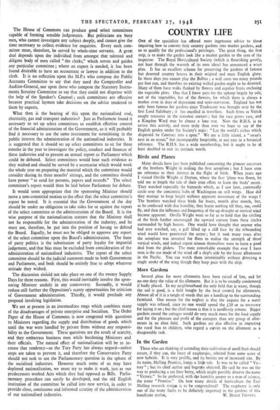COUNTRY LIFE
ONE of the specialists has offered most ingenuous advice to those inquiring how to convert their country gardens into market gardens, and so to qualify for the professional's privileges. The great thing, the first step, is to make the garden look like a market garden to the eyes of the inspector. The Royal Horticultural Society (which is flourishing greatly, not least through the warmth of its own ideas) has announced a wiser, plan. It has an excellent scheme for preserving the gardens of famous but deserted country houses in their original and most English glory. In these days you cannot play the Ralbus ; a wall costs too many pounds per foot run, and therefore no existing walled garden ought to be deserted. Many of them have walks flanked by flowers and espalier fruits enclosing the vegetable plots. One that I know pays for the upkeep largely by sale, not of the vegetables, but of the flowers, for which there is always a market even in days of depression and semi-starvation. England has not only been famous for gardens since Tradescant was brought over by the first Lord Salisbury ; it has excelled in travellers. Such firms as Veitch sought treasures in the remotest corners ; but the race grows rare, and a Kingdon Ward may be almost a lone star. Now the R.H.S. is to revive this activity, and more truly than ever we hope to say of the English garden .under the Society's aegis : "Let the world's riches which. dispersed be Contract into a span." We are a little island, a " swan's nest in an ocean," but incomparably hospitable, at any rate in a botanical, reference. The R.H.S. has a wide membership, but it ought to be at least doubled to suit its intrinsic worth.


































 Previous page
Previous page